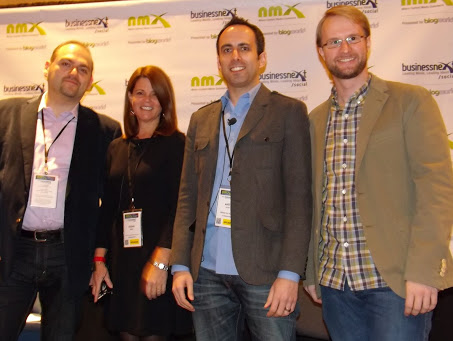 Do brands care whether they have influence in social media? They certainly should, said members of the three-person panel on social influence at NMX Monday.
Do brands care whether they have influence in social media? They certainly should, said members of the three-person panel on social influence at NMX Monday.
Jonathan Dick, Director of Business Development at Klout, kicked off the conversation with his thoughts that brands do care, though they may struggle to understand or measure their influence.
Andy Levey, Senior Manager of New Media & Analytics at Cirque du Soleil, believes social influence is incredibly important for brands to connect with and engage fans. “It’s all about them; if we don’t have fans talking about us, we’re not in business,” he said. Cirque du Soleil are lucky, Levey admits. Their brand is creative and entertaining; many businesses lack this stroke of good fortune. What can you do if your brand isn’t inherently entertaining or you’re not in the media space and therefore informative by nature?
Be realistic, advises Susan Borst, Director of Industry Initiatives at the Interactive Advertising Bureau (IAB). Brands needs to discover which interactions are truly valuable and understand their goals going in to any social situation, she said.
Dick recommends that brands start within their own network. Begin with your own customers. Find out what they need by listening, then use content to give it to them. “Why does influence matter to Crest?” he asks. “It’s because a lot of people talk about oral care online. It’s not exciting, yet people are talking about it. You want to reach mothers and those who drive purchase decisions.”
Once you’ve identified those people who may talk about your brand, how do you find and reach them, then inspire them to actually engage, asked moderator Steve Faktor of Idea Faktory.
You need to dig deeper and segment your target audience, recommends Levey. So you want to reach moms… which ones? Are they in their 20s, 30s, or 40s? What income bracket does their household fall into, and does that matter? Setting clear goals is key, he said.
The panelists agreed, social media monitoring and analysis is incredibly important. These are the insights that can help brands determine ROI and drive future strategy.
Borst notes that many brands are using social more than actually being social. There’s a massive data model behind social activity that is key to understanding the value of individual interactions.
Cirque du Soleil actually brought in a financial analyst with no knowledge of social media or online marketing to help identify their goals and build out a business model for their social channels. This person wasn’t required to have social knowledge, said Levey, because this was just the first step, albeit an important one, in their strategy.
Brands get that what they’re doing right now isn’t working, said Dick. Increasingly, brands are “getting it;” that they need quality and context around the numbers they’re measuring. Influence is about driving activity on your networks, but sentiment and context are key.
One audience member asked the panel how, exactly, someone from a traditionally creative background, focused on content creation, can better improve their marketing skills. Content creation and social are two degrees away from making money, said Faktor. This is where business model connectivity with social media is so critical for brands.
Branded content is important, he said, but what is its purpose? It needs to drive people back to the website, to inspire them to complete your desired action, which must be closely aligned to business goals.
Borst recommends that brands move beyond trying to simply identify who their fans and customers are, to determining what they need and how you can deliver it. At Cirque du Soleil, says Levey, they have to make choices every day about which customer groups need to be nurtured through social and how they can effectively do this. They use influencers in their target markets, as an example, to reach more people in a scalable way.
Overall, brands need to care about social influence and also need to get smarter about the way they use social to build relationships. Companies must better align their online marketing efforts to business goals, in order to build influence that matters and results in growth for the business. After all, that’s the whole point, isn’t it?
Is your company one of those highly evolved, like Cirque du Soleil, or are you working on better tying your social marketing strategy to business goals? Share your tips and experience in the comments!


